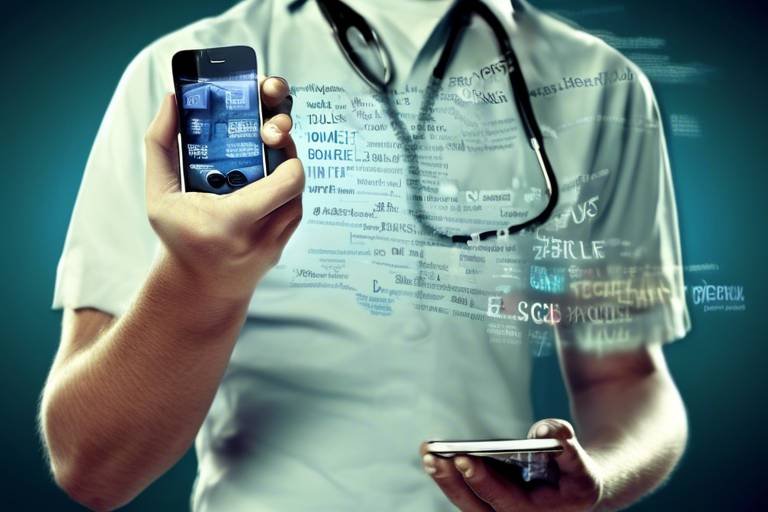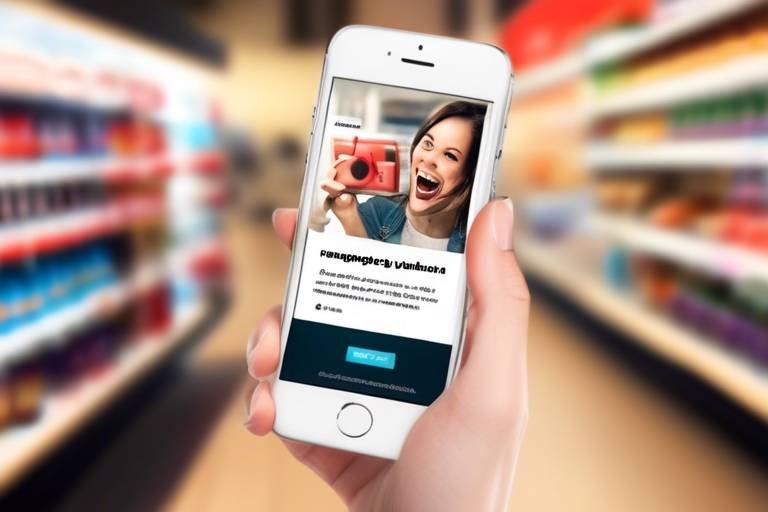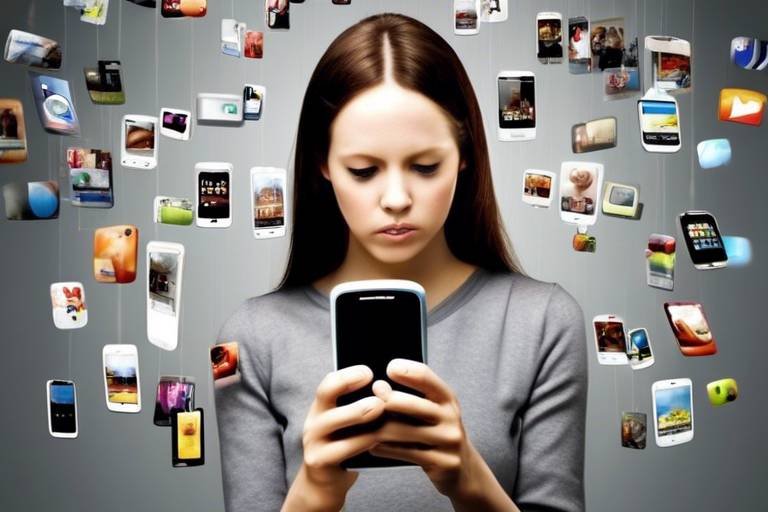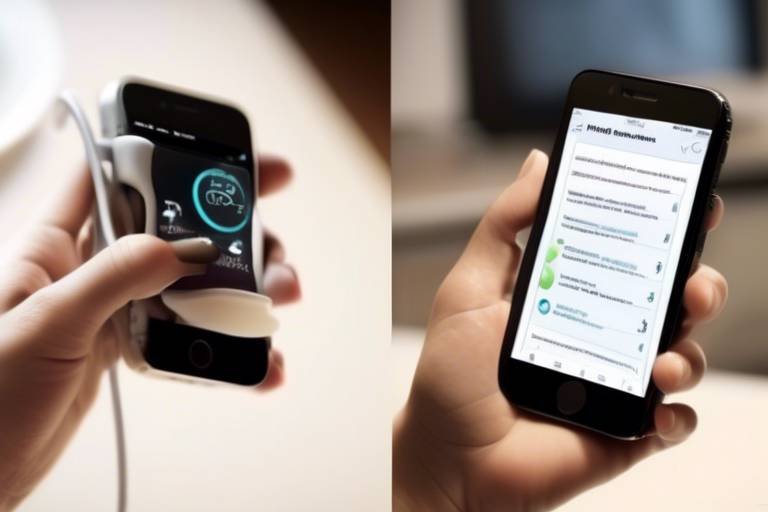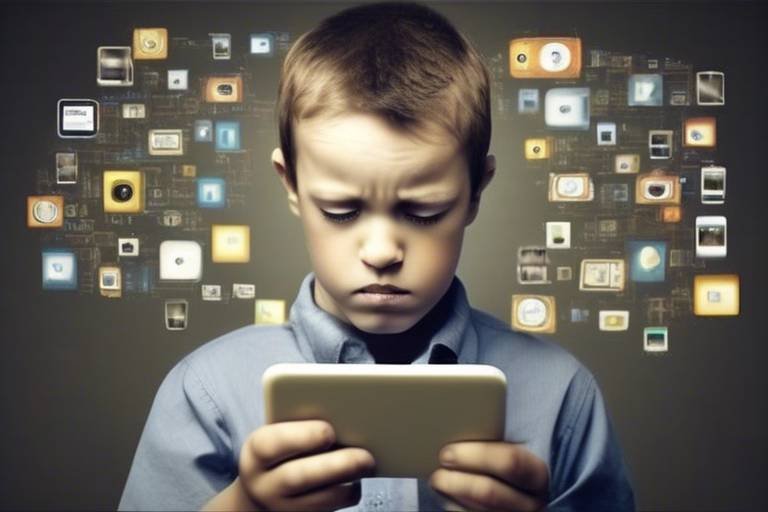The Effects of Mobile Technology on Health Awareness
In today's fast-paced world, mobile technology has become an indispensable part of our daily lives, influencing various aspects, including our health awareness. The advent of smartphones and wearable devices has revolutionized how we approach health and wellness. Imagine having a personal health assistant right in your pocket, ready to provide you with information, track your fitness, and even connect you with healthcare professionals at a moment's notice. This article explores how mobile technology influences health awareness, examining its benefits and challenges, and providing insights into its role in promoting healthier lifestyles and informed decision-making among users.
Mobile technology facilitates real-time communication between healthcare providers and patients, improving the dissemination of health information and fostering timely interventions for better health outcomes. For instance, consider how easy it is to send a quick message to your doctor about a concern or to receive reminders for medication. This immediacy not only enhances the patient experience but also encourages adherence to treatment plans. With features like video calls and instant messaging, healthcare professionals can address issues promptly, reducing the chances of complications. The ability to communicate effectively is a game-changer, making healthcare more accessible and responsive than ever before.
With mobile devices, individuals can access a wealth of health-related information, empowering them to make informed decisions regarding their health and wellness. Whether it's searching for symptoms, understanding medical conditions, or exploring treatment options, the internet puts a vast repository of knowledge at our fingertips. However, it’s crucial to discern credible sources from unreliable ones. Here are some key points to consider:
- Credibility: Always check the source of your health information. Reputable medical websites and peer-reviewed articles are more reliable than random blogs.
- Updates: Health information can change rapidly. Ensure you are looking at the most current data and guidelines.
- Consult Professionals: When in doubt, consult a healthcare professional for personalized advice.
Health applications provide personalized health tracking and management tools, enabling users to monitor their fitness, nutrition, and overall well-being conveniently. These apps can serve as a virtual coach, guiding users toward healthier habits. For example, many apps allow users to set specific health goals, whether it's losing weight, building muscle, or simply staying active. The integration of gamification elements—like earning rewards for reaching milestones—makes the journey enjoyable and engaging.
Many mobile health apps include fitness tracking features that encourage physical activity and help users set and achieve their fitness goals. By using sensors and GPS technology, these apps can track steps taken, calories burned, and even heart rate during workouts. This real-time feedback can be incredibly motivating. Imagine running a mile and instantly seeing how your time improves each week. It’s like having a personal trainer cheering you on!
These apps often offer nutritional advice, meal planning, and calorie tracking, promoting healthier eating habits among users. Users can log their meals, receive feedback on their dietary choices, and even get suggestions for healthier alternatives. Think of it as having a nutritionist in your pocket, helping you make better food choices every day.
Telemedicine allows patients to consult with healthcare professionals remotely, increasing accessibility to medical advice and reducing the need for in-person visits. This is particularly beneficial for those living in remote areas or for individuals with mobility issues. With just a few taps on their smartphones, patients can schedule appointments, discuss symptoms, and receive prescriptions without leaving their homes. This convenience not only saves time but also ensures that patients receive timely medical attention, which is crucial for effective treatment.
Despite its advantages, mobile technology poses challenges, including misinformation, data privacy concerns, and the digital divide affecting access for certain populations. While the benefits are significant, it’s essential to navigate these challenges carefully to ensure that mobile health technology serves its intended purpose effectively.
The ease of accessing health information online can lead to the spread of misinformation, which may negatively impact health decisions and behaviors. Users might stumble upon misleading articles or unverified claims that could lead to harmful choices. It's vital to approach online health information with a critical eye and to prioritize resources that are backed by scientific evidence.
Users often worry about the security of their personal health data when using mobile health technologies, raising questions about privacy and trust. With data breaches becoming more common, it's essential for users to understand how their information is being used and protected. Always read privacy policies and choose apps that prioritize user security.
As mobile technology continues to evolve, its potential to transform health awareness and healthcare delivery will expand, offering new opportunities for improving public health outcomes. Innovations like artificial intelligence and machine learning are set to enhance personalized healthcare, making it more efficient and effective. Imagine a future where your mobile device can predict health issues before they arise, allowing for proactive measures to be taken. The possibilities are indeed exciting!
- What are mobile health apps? Mobile health apps are applications designed to help users manage their health and wellness through tracking, guidance, and communication with healthcare providers.
- How can I ensure the health information I find online is reliable? Look for information from reputable medical sources, check for citations, and consult with healthcare professionals when in doubt.
- What are the privacy concerns with mobile health technology? Users should be aware of how their data is collected, stored, and shared by health apps, and choose those that prioritize data security.

Enhancing Health Communication
Mobile technology has revolutionized the way we communicate, and in the realm of healthcare, this transformation is nothing short of remarkable. Imagine being able to chat with your doctor from the comfort of your home, or receiving instant alerts about your health status right on your smartphone. This is the power of mobile technology in enhancing health communication. It not only bridges the gap between healthcare providers and patients but also ensures that essential health information is disseminated promptly and effectively.
One of the most significant benefits of mobile health technology is its ability to facilitate real-time communication. Patients can now reach out to their healthcare providers with just a few taps on their screens. This immediacy can lead to faster diagnoses and timely interventions, which are crucial for better health outcomes. For instance, if a patient experiences unusual symptoms, they can quickly message their doctor, who can then provide advice or suggest necessary tests without the patient having to wait for a scheduled appointment.
Moreover, mobile technology fosters a more engaging and interactive experience for patients. Through various platforms, healthcare providers can share educational materials, health tips, and updates about medical conditions directly with their patients. This not only empowers individuals with knowledge but also encourages them to take an active role in managing their health. For example, a healthcare provider might send out a quick video explaining how to manage diabetes, making the information more relatable and easier to understand.
In addition, mobile health solutions often include features that allow for monitoring and feedback. Devices such as smartwatches and fitness trackers can collect data on a user's physical activity, heart rate, and sleep patterns. This information can be shared with healthcare providers, allowing for a more comprehensive understanding of a patient's health status. The continuous feedback loop created by these technologies helps in making informed decisions about treatment plans and lifestyle changes.
However, while the benefits of enhanced health communication through mobile technology are clear, it is essential to recognize the importance of effective messaging. Healthcare providers must ensure that the information they share is accurate, clear, and tailored to the needs of their patients. This involves not only the use of simple language but also the consideration of cultural and social factors that may affect how health information is received and understood.
To sum it up, mobile technology has become a vital tool in enhancing health communication, making healthcare more accessible and responsive. As we continue to embrace these innovations, we can expect a future where health communication is not just about exchanging information but about building meaningful relationships between patients and providers, ultimately leading to better health outcomes for all.
- How does mobile technology improve communication between patients and healthcare providers?
Mobile technology facilitates real-time communication, allowing patients to reach out to healthcare providers easily, which can lead to quicker diagnoses and timely interventions. - What are some examples of mobile health technologies?
Examples include health apps, telemedicine platforms, and wearable devices like fitness trackers and smartwatches. - Are there any downsides to using mobile technology in healthcare?
Yes, challenges include misinformation, data privacy concerns, and potential health disparities among different populations.

Access to Health Information
In today's fast-paced world, the way we access health information has dramatically changed, thanks to mobile technology. Gone are the days when you had to wait for a doctor's appointment or sift through dusty medical journals to find answers about your health. Now, with just a few taps on your smartphone, you can unlock a treasure trove of health-related information. This accessibility empowers individuals to take control of their health like never before. But what does this really mean for us?
Mobile devices serve as gateways to a vast array of resources, allowing users to explore topics ranging from chronic disease management to mental health support. Imagine having the ability to find detailed information about your symptoms or treatment options right in your pocket! This instant access not only helps you make informed decisions but also promotes a proactive approach to health. However, it's crucial to navigate this sea of information wisely.
To illustrate the impact of mobile technology on health information access, consider the following:
| Aspect | Benefits | Considerations |
|---|---|---|
| Instant Information | Access to real-time data and updates on health topics. | Risk of misinformation and unreliable sources. |
| Personalized Health | Ability to tailor health information based on individual needs. | Overwhelming choices can lead to confusion. |
| Community Support | Connect with others facing similar health challenges. | Online communities may not always provide accurate advice. |
Mobile health apps, in particular, have revolutionized how we manage our health. These applications provide tailored health information at our fingertips, ranging from workout regimens to dietary plans. For instance, a fitness app can not only track your physical activity but also suggest exercises based on your goals and preferences. This level of personalization encourages users to engage more actively with their health, making it easier to adopt healthier habits.
Furthermore, mobile technology allows individuals to stay updated on the latest health trends and research. By subscribing to health blogs, podcasts, or following reputable health organizations on social media, users can receive valuable insights directly on their devices. However, it’s essential to verify the credibility of the sources to avoid falling prey to misinformation.
In summary, mobile technology has opened the door to a world of health information that is both empowering and enlightening. While it provides unprecedented access to knowledge, users must remain vigilant and discerning about the information they consume. The next time you reach for your phone to look up a health concern, remember that with great power comes great responsibility!
- How can I ensure the health information I find online is reliable?
Look for information from reputable sources such as government health websites, recognized medical organizations, and peer-reviewed journals. Always cross-check facts and consult healthcare professionals when in doubt.
- Are mobile health apps safe to use?
Most reputable health apps prioritize user privacy and data security. However, it's important to read the privacy policy and understand how your data will be used before downloading any app.
- Can mobile technology replace traditional healthcare?
While mobile technology offers valuable tools for health management, it should complement, not replace, traditional healthcare. Always consult a healthcare professional for serious health concerns.

Mobile Health Apps
This article explores how mobile technology influences health awareness, examining its benefits and challenges, and providing insights into its role in promoting healthier lifestyles and informed decision-making among users.
Mobile technology facilitates real-time communication between healthcare providers and patients, improving the dissemination of health information and fostering timely interventions for better health outcomes.
With mobile devices, individuals can access a wealth of health-related information, empowering them to make informed decisions regarding their health and wellness.
Mobile health apps have revolutionized the way we approach our health and wellness. These applications serve as personal health assistants, providing users with the tools they need to monitor and manage their health conveniently. Imagine having a fitness coach, a nutritionist, and a health tracker all in your pocket! With just a few taps on your smartphone, you can access a plethora of features that cater to your individual health needs. Whether you want to track your workouts, monitor your diet, or even keep tabs on your mental well-being, mobile health apps have got you covered.
One of the standout features of these apps is their personalized health tracking. Users can input their goals—be it weight loss, muscle gain, or simply maintaining a healthy lifestyle—and the app will create a tailored plan to help them achieve these objectives. For instance, if you’re training for a marathon, the app can suggest a running schedule, track your mileage, and even remind you to hydrate!
Moreover, many mobile health applications come equipped with fitness tracking features. These features encourage users to engage in regular physical activity by setting challenges and milestones. Users can monitor their steps, calories burned, and even heart rate, making it easier to stay motivated and accountable. Some popular fitness apps even allow you to share your achievements with friends, turning fitness into a fun, social experience.
In addition to fitness tracking, mobile health apps often include nutritional guidance. They provide users with meal planning tools, calorie counters, and recipes tailored to their dietary preferences. For example, if you're a vegan looking to maintain a balanced diet, the app can suggest meals rich in protein and essential nutrients. This kind of support promotes healthier eating habits and empowers users to make better food choices.
However, it’s important to remember that while these apps are incredibly useful, they should complement, not replace, professional medical advice. Users should always consult healthcare providers for serious health concerns. The key is to use these apps as a resource to enhance your health journey, not as a sole source of information.
Many mobile health apps include fitness tracking features that encourage physical activity and help users set and achieve their fitness goals. These features often utilize GPS technology to track outdoor activities like running or cycling, providing users with detailed statistics on their performance. This real-time feedback can be a powerful motivator, pushing users to improve their performance and reach new heights.
These apps often offer nutritional advice, meal planning, and calorie tracking, promoting healthier eating habits among users. By logging their meals and snacks, users can gain insights into their eating patterns and make adjustments as needed. For example, if you notice you’re consuming too much sugar, the app can suggest healthier alternatives, helping you to stay on track with your health goals.
Telemedicine allows patients to consult with healthcare professionals remotely, increasing accessibility to medical advice and reducing the need for in-person visits.
Despite its advantages, mobile technology poses challenges, including misinformation, data privacy concerns, and the digital divide affecting access for certain populations.
The ease of accessing health information online can lead to the spread of misinformation, which may negatively impact health decisions and behaviors.
Users often worry about the security of their personal health data when using mobile health technologies, raising questions about privacy and trust.
As mobile technology continues to evolve, its potential to transform health awareness and healthcare delivery will expand, offering new opportunities for improving public health outcomes.
- What are mobile health apps?
Mobile health apps are applications designed to help users monitor and manage their health and wellness through features like fitness tracking, nutritional guidance, and telemedicine services. - How can mobile health apps improve my health?
By providing personalized health tracking, nutritional advice, and access to healthcare professionals, these apps empower users to make informed health decisions and achieve their wellness goals. - Are there any risks associated with using mobile health apps?
Yes, while mobile health apps offer numerous benefits, they can also pose risks such as misinformation and data privacy concerns. It's essential to use reputable apps and consult healthcare providers for serious health issues.

Fitness Tracking Features
This article explores how mobile technology influences health awareness, examining its benefits and challenges, and providing insights into its role in promoting healthier lifestyles and informed decision-making among users.
Mobile technology facilitates real-time communication between healthcare providers and patients, improving the dissemination of health information and fostering timely interventions for better health outcomes.
With mobile devices, individuals can access a wealth of health-related information, empowering them to make informed decisions regarding their health and wellness.
Health applications provide personalized health tracking and management tools, enabling users to monitor their fitness, nutrition, and overall well-being conveniently.
Fitness tracking features in mobile health apps have revolutionized the way individuals approach their physical activity. Imagine having a personal trainer right in your pocket, motivating you to move and reach your fitness goals! These features typically include:
- Step Counters: Most fitness apps come equipped with pedometers that track your daily steps, encouraging you to hit that magical number of 10,000 steps.
- Workout Logging: Users can log various workouts, from running to yoga, allowing them to keep a record of their progress over time.
- Goal Setting: Many apps allow users to set specific fitness goals, whether it’s running a certain distance or lifting a particular weight, making fitness feel more achievable.
Additionally, these apps often integrate with wearable devices, providing real-time data and feedback. This level of connectivity not only enhances motivation but also allows users to visualize their progress through graphs and statistics. For instance, seeing a weekly summary of your activity can be incredibly motivating. Just think about how satisfying it feels to see that upward trend in your weekly steps or workout frequency!
Moreover, some apps even incorporate social features, allowing users to share their achievements with friends or join challenges. This creates a community feeling, where users can encourage each other, share tips, and celebrate milestones together. The social aspect can be the difference between sticking to a routine or giving up. After all, who doesn’t love a little friendly competition?
Telemedicine allows patients to consult with healthcare professionals remotely, increasing accessibility to medical advice and reducing the need for in-person visits.
Despite its advantages, mobile technology poses challenges, including misinformation, data privacy concerns, and the digital divide affecting access for certain populations.
The ease of accessing health information online can lead to the spread of misinformation, which may negatively impact health decisions and behaviors.
Users often worry about the security of their personal health data when using mobile health technologies, raising questions about privacy and trust.
As mobile technology continues to evolve, its potential to transform health awareness and healthcare delivery will expand, offering new opportunities for improving public health outcomes.
Q1: How do fitness tracking apps help improve my health?
A1: Fitness tracking apps help by providing personalized insights, setting achievable goals, and keeping you accountable, making it easier to adopt and maintain a healthier lifestyle.
Q2: Are there any risks associated with using mobile health apps?
A2: Yes, risks include data privacy concerns and the potential for misinformation. It’s crucial to use reputable apps and ensure your data is secure.
Q3: Can fitness tracking features replace a personal trainer?
A3: While fitness tracking features offer valuable insights and motivation, they cannot fully replace the personalized guidance and accountability that a personal trainer provides.

Nutritional Guidance
Nutritional guidance has become a cornerstone of modern health management, especially with the rise of mobile health applications. These apps serve as personalized coaches in our pockets, offering tailored advice that resonates with our individual health goals. Imagine having a nutritionist available 24/7, ready to provide insights on what to eat, when to eat, and how to balance your meals. That's the power of mobile technology in the realm of nutrition!
With the tap of a finger, users can access a treasure trove of information on healthy eating. Many apps not only provide basic nutritional facts but also allow users to track their daily intake of calories, macronutrients, and vitamins. This level of detail empowers individuals to make informed choices about their diets, fostering a sense of accountability. For instance, if you’re trying to lose weight, a nutritional app can help you set a calorie limit and suggest meals that fit within your goals. It’s like having a personal dietitian who understands your preferences and restrictions.
Moreover, these applications often come equipped with features that promote meal planning and recipe suggestions tailored to specific dietary needs. Whether you’re vegan, gluten-free, or just looking to eat healthier, there’s something for everyone. Users can browse through a variety of recipes that not only meet their dietary restrictions but also excite their taste buds. Picture this: you’re scrolling through your app, and you find a delicious quinoa salad that’s packed with nutrients and easy to prepare. It’s a win-win!
Furthermore, many apps include educational resources that explain the importance of various nutrients and how they contribute to overall health. For example, users can learn about the benefits of fiber in digestion or the role of protein in muscle repair. This knowledge equips individuals to make better food choices, transforming their relationship with food from one of mere consumption to one of informed decision-making.
However, it’s essential to approach nutritional guidance from mobile apps with a critical eye. While these tools can be incredibly helpful, they are not a substitute for professional advice. Users should always consider consulting with a healthcare provider or a registered dietitian, especially when making significant changes to their diet. In the ever-evolving landscape of nutrition, the blend of technology and professional insight can lead to the best outcomes.
In conclusion, mobile health applications are revolutionizing the way we approach nutrition. They provide not just guidance but also motivation, helping users to embark on their journey towards healthier eating habits. With the right app, anyone can take charge of their nutritional health and make choices that lead to a happier, healthier life.
- Can I trust the nutritional information provided by mobile apps?
While many apps source their information from reputable databases, it’s always good to cross-reference with trusted health websites or consult a professional. - Are there mobile apps specifically for dietary restrictions?
Yes! Many apps cater to specific dietary needs, including vegan, keto, and gluten-free diets, providing tailored recipes and meal plans. - How can I stay motivated to follow the nutritional guidance from apps?
Setting achievable goals, tracking progress, and engaging with community features within the app can help maintain motivation.

Telemedicine Services
This article explores how mobile technology influences health awareness, examining its benefits and challenges, and providing insights into its role in promoting healthier lifestyles and informed decision-making among users.
Mobile technology facilitates real-time communication between healthcare providers and patients, improving the dissemination of health information and fostering timely interventions for better health outcomes.
With mobile devices, individuals can access a wealth of health-related information, empowering them to make informed decisions regarding their health and wellness.
Health applications provide personalized health tracking and management tools, enabling users to monitor their fitness, nutrition, and overall well-being conveniently.
Many mobile health apps include fitness tracking features that encourage physical activity and help users set and achieve their fitness goals.
These apps often offer nutritional advice, meal planning, and calorie tracking, promoting healthier eating habits among users.
Telemedicine is revolutionizing the way patients and healthcare professionals interact. Imagine being able to consult your doctor from the comfort of your home, without the hassle of traffic or waiting rooms. This convenience not only saves time but also increases accessibility for individuals who may have mobility issues or live in remote areas. Telemedicine platforms allow patients to schedule virtual appointments, where they can discuss their symptoms, receive diagnoses, and even get prescriptions—all with just a few taps on their mobile devices.
Furthermore, telemedicine services are particularly beneficial during public health crises, such as the COVID-19 pandemic, where in-person visits pose health risks. Patients can connect with healthcare providers through video calls or chat, ensuring that they receive the care they need while minimizing exposure to illnesses. This shift towards virtual consultations is not just a temporary fix; it’s paving the way for a new era in healthcare delivery.
In addition to general consultations, telemedicine encompasses various specialized services, including:
- Remote monitoring of chronic conditions
- Mental health counseling
- Follow-up care after surgeries
These services not only enhance patient engagement but also allow healthcare providers to monitor patients' progress more closely, ensuring that they adhere to treatment plans and make necessary adjustments in real-time. The integration of telemedicine with mobile technology is a game-changer, making healthcare more responsive and patient-centered.
Despite its advantages, mobile technology poses challenges, including misinformation, data privacy concerns, and the digital divide affecting access for certain populations.
The ease of accessing health information online can lead to the spread of misinformation, which may negatively impact health decisions and behaviors.
Users often worry about the security of their personal health data when using mobile health technologies, raising questions about privacy and trust.
As mobile technology continues to evolve, its potential to transform health awareness and healthcare delivery will expand, offering new opportunities for improving public health outcomes.
- What is telemedicine?
Telemedicine refers to the use of technology to provide healthcare services remotely, allowing patients to consult with healthcare professionals without needing to visit a clinic or hospital. - How does telemedicine benefit patients?
Telemedicine offers convenience, accessibility, and timely medical advice, especially for those with mobility issues or those living in remote areas. - Are telemedicine consultations secure?
Most telemedicine platforms use encryption and other security measures to protect patient data and ensure privacy during consultations. - Can I get prescriptions through telemedicine?
Yes, healthcare providers can prescribe medications during telemedicine consultations, provided they assess the patient's condition appropriately.

Challenges of Mobile Health Technology
While mobile health technology has undoubtedly revolutionized the way we approach health awareness, it is not without its challenges. One of the most pressing issues is the risk of misinformation. With the vast amount of health information available at our fingertips, it can be incredibly easy to stumble upon inaccurate or misleading content. This can lead to poor health decisions, as individuals may follow advice that is not scientifically backed. Imagine reading an article that suggests a miracle diet without any credible sources; it’s like taking health advice from a stranger in a coffee shop!
Another significant challenge is the concern surrounding data privacy. Users often share sensitive personal health information when using mobile health apps, and the fear of this data being misused can deter many from fully embracing these technologies. It's akin to inviting someone into your home and then worrying about what they might do with your personal belongings. As a result, trust becomes a crucial factor in the adoption of mobile health tools. Users need to feel confident that their information is secure and that they won’t fall victim to data breaches.
Moreover, there exists a digital divide that affects access to mobile health technology. Not everyone has equal access to smartphones or reliable internet connections, especially in rural or underserved urban areas. This disparity can lead to significant gaps in health awareness and outcomes. For instance, individuals without smartphones may miss out on critical health information or the opportunity to engage in telemedicine services. As we move forward, addressing this divide is essential to ensure that mobile health technology benefits everyone, not just those with the latest gadgets.
In summary, while mobile health technology offers incredible advantages in promoting health awareness and improving access to healthcare, it is crucial to address these challenges. By combating misinformation, ensuring data privacy, and bridging the digital divide, we can harness the full potential of mobile health technology and create a healthier future for all.
- What is mobile health technology? Mobile health technology refers to the use of mobile devices, such as smartphones and tablets, to support health-related services and information.
- How does mobile health technology improve health awareness? It provides easy access to health information, facilitates communication with healthcare providers, and offers tools for tracking health metrics.
- What are the risks associated with mobile health technology? Risks include misinformation, data privacy concerns, and unequal access to technology.
- Can mobile health apps really help with fitness and nutrition? Yes, many mobile health apps offer personalized tracking and recommendations that can motivate users to achieve their health goals.

Misinformation Risks
This article explores how mobile technology influences health awareness, examining its benefits and challenges, and providing insights into its role in promoting healthier lifestyles and informed decision-making among users.
Mobile technology facilitates real-time communication between healthcare providers and patients, improving the dissemination of health information and fostering timely interventions for better health outcomes.
With mobile devices, individuals can access a wealth of health-related information, empowering them to make informed decisions regarding their health and wellness.
Health applications provide personalized health tracking and management tools, enabling users to monitor their fitness, nutrition, and overall well-being conveniently.
Many mobile health apps include fitness tracking features that encourage physical activity and help users set and achieve their fitness goals.
These apps often offer nutritional advice, meal planning, and calorie tracking, promoting healthier eating habits among users.
Telemedicine allows patients to consult with healthcare professionals remotely, increasing accessibility to medical advice and reducing the need for in-person visits.
Despite its advantages, mobile technology poses challenges, including misinformation, data privacy concerns, and the digital divide affecting access for certain populations.
In our fast-paced digital world, the ease of accessing health information online can be a double-edged sword. While it empowers individuals, it also opens the floodgates to the spread of misinformation. This misinformation can lead to confusion, fear, and poor health decisions. Imagine scrolling through social media and coming across a post claiming that a certain fruit can cure all ailments. While it might sound appealing, such claims often lack scientific backing and can divert individuals from seeking proper medical advice.
Moreover, the sheer volume of information available can overwhelm users. They might encounter conflicting advice from various sources, leading to uncertainty about what is accurate. Here are some common sources of misinformation:
- Social Media: Platforms like Facebook and Instagram often circulate health myths and unverified claims.
- Unverified Websites: Many websites present health information without credible sources or scientific evidence.
- Word of Mouth: Friends and family may share health tips that are based on personal experiences rather than facts.
This landscape of misinformation can negatively impact health behaviors. For instance, someone may choose to skip vaccinations after reading misleading articles online, putting not only their health at risk but also that of the community. It’s crucial for users to develop critical thinking skills when consuming health information online. Always ask questions like, “Is this information backed by credible research?” or “What do reputable health organizations say about this?”
In conclusion, while mobile technology has the potential to enhance health awareness, the risks associated with misinformation cannot be overlooked. Users must navigate this digital health landscape carefully, ensuring they rely on trustworthy sources to make informed health decisions.
As mobile technology continues to evolve, its potential to transform health awareness and healthcare delivery will expand, offering new opportunities for improving public health outcomes.
- What are mobile health apps?
Mobile health apps are applications designed to help users manage their health by tracking fitness, nutrition, and other health-related metrics.
- How can I ensure the health information I find online is credible?
Look for information from reputable health organizations, check the credentials of the authors, and verify claims with scientific studies.
- What are the benefits of telemedicine?
Telemedicine offers convenience, increased access to healthcare professionals, and the ability to receive medical advice without the need for in-person visits.

Data Privacy Concerns
In the age of digital health, data privacy has emerged as a significant concern for users of mobile health technologies. As we store more of our personal health information on our devices, the question of who has access to that data and how it is protected becomes paramount. Imagine sharing your health details with a fitness app, only to find out that your data is being sold to third parties without your consent. This scenario is not just a figment of imagination; it’s a reality that many users face today.
With the rise of mobile health applications, individuals often find themselves caught in a web of terms and conditions that are lengthy and filled with legal jargon. Many users simply click “accept” without fully understanding what they are agreeing to. This lack of awareness can lead to serious implications regarding their data privacy. According to a recent study, over 80% of mobile health app users are concerned about their personal data being misused. Such statistics highlight the pressing need for transparency and better privacy practices within the mobile health industry.
Furthermore, the issue of data breaches cannot be overlooked. Just like any other digital platform, mobile health technologies are vulnerable to cyberattacks. In fact, several high-profile breaches have resulted in the exposure of sensitive health information, leading to identity theft and financial fraud. Users must be vigilant and conduct thorough research before downloading health apps. They should look for apps that prioritize user privacy and have robust security measures in place.
To better understand the landscape of data privacy in mobile health technology, let’s take a look at some common concerns:
- Informed Consent: Are users fully aware of how their data will be used?
- Data Storage: Where is the data stored, and is it secure?
- Third-Party Access: Are there any third parties that can access this information?
- Regulatory Compliance: Does the app comply with health regulations like HIPAA?
Ultimately, the balance between utilizing mobile health technology for its benefits while safeguarding personal data is a tightrope walk. Users must educate themselves about their rights and the policies of the apps they use. As the digital health landscape evolves, it’s crucial for developers and healthcare providers to prioritize user privacy and build trust through transparent practices. Only then can we harness the full potential of mobile technology in promoting health awareness without compromising our personal data.
- What should I look for in a mobile health app?
Prioritize apps that have clear privacy policies, strong security features, and positive user reviews regarding data protection.
- How can I protect my data when using health apps?
Use apps that allow you to control what data is shared, and regularly review app permissions on your device.
- Are all health apps required to comply with privacy regulations?
Not all apps are regulated; however, those that handle sensitive health information should comply with regulations like HIPAA.

The Future of Mobile Health Technology
This article explores how mobile technology influences health awareness, examining its benefits and challenges, and providing insights into its role in promoting healthier lifestyles and informed decision-making among users.
Mobile technology facilitates real-time communication between healthcare providers and patients, improving the dissemination of health information and fostering timely interventions for better health outcomes.
With mobile devices, individuals can access a wealth of health-related information, empowering them to make informed decisions regarding their health and wellness.
Health applications provide personalized health tracking and management tools, enabling users to monitor their fitness, nutrition, and overall well-being conveniently.
Many mobile health apps include fitness tracking features that encourage physical activity and help users set and achieve their fitness goals.
These apps often offer nutritional advice, meal planning, and calorie tracking, promoting healthier eating habits among users.
Telemedicine allows patients to consult with healthcare professionals remotely, increasing accessibility to medical advice and reducing the need for in-person visits.
Despite its advantages, mobile technology poses challenges, including misinformation, data privacy concerns, and the digital divide affecting access for certain populations.
The ease of accessing health information online can lead to the spread of misinformation, which may negatively impact health decisions and behaviors.
Users often worry about the security of their personal health data when using mobile health technologies, raising questions about privacy and trust.
As we look ahead, the future of mobile health technology is not just bright; it's practically glowing with potential. Imagine a world where health management is as simple as checking your phone. This transformation is already underway, with advancements in artificial intelligence (AI), machine learning, and wearable technology set to revolutionize how we approach health awareness and care.
One of the most exciting prospects is the integration of AI in mobile health apps. These smart applications will not only track your physical activity and dietary habits but also analyze your data to provide personalized health recommendations. For instance, an app might suggest specific workouts based on your fitness level or dietary adjustments based on your recent eating patterns. The goal is to create a tailored health experience that adapts to your unique lifestyle.
Moreover, the rise of wearable devices, such as smartwatches and fitness trackers, will enhance the capabilities of mobile health technology. These devices can continuously monitor vital signs like heart rate, sleep patterns, and even blood glucose levels. This real-time data can be synced with mobile applications, allowing users to gain insights into their health trends over time. For example, if your smartwatch detects irregular heartbeats, it can alert you to consult a healthcare professional, potentially preventing serious health issues.
However, as we embrace these technological advancements, we must also address the challenges they bring. Data security will remain a top priority as personal health information becomes increasingly digitized. Users need to feel confident that their data is protected from breaches and misuse. Therefore, developers and healthcare organizations must prioritize robust security measures and transparent privacy policies.
Furthermore, as mobile health technology expands, we must ensure that it is accessible to all. The digital divide could lead to disparities in health outcomes, especially among marginalized communities. Efforts must be made to provide affordable devices and internet access to those who need it most. In this way, we can create a more equitable health landscape where everyone has the tools to manage their health effectively.
In conclusion, the future of mobile health technology holds immense promise. With continued innovation, we can expect a more connected, informed, and healthier society. So, are you ready to embrace this digital health revolution? Your phone may soon be your most trusted health advisor!
- What is mobile health technology? - Mobile health technology refers to the use of mobile devices and applications to support health management and information dissemination.
- How can mobile health apps improve my health? - These apps can help you track fitness, monitor nutrition, and provide personalized health recommendations based on your data.
- Are there risks associated with mobile health technology? - Yes, risks include misinformation, data privacy concerns, and potential inequalities in access to technology.
- What does the future hold for mobile health technology? - The future includes advancements in AI, wearable devices, and a focus on improving accessibility and data security.
Frequently Asked Questions
- How does mobile technology enhance health communication?
Mobile technology improves health communication by allowing real-time interaction between healthcare providers and patients. This means you can get timely health advice and interventions, making it easier to manage your health effectively.
- What types of health information can I access through mobile devices?
With mobile devices, you can access a wide range of health-related information, from medical conditions and treatments to fitness tips and nutritional advice. This empowers you to make informed decisions about your health and wellness.
- What are mobile health apps and how do they help?
Mobile health apps are applications designed to assist users in tracking and managing their health. They offer features like fitness tracking, nutritional guidance, and personalized health management tools that make it easier to monitor your overall well-being.
- Can mobile health apps help me achieve my fitness goals?
Absolutely! Many mobile health apps come equipped with fitness tracking features that encourage physical activity. They help you set, track, and achieve your fitness goals, making it fun and motivating to stay active.
- What nutritional guidance can I find in mobile health apps?
Mobile health apps often provide nutritional advice, meal planning options, and calorie tracking features. This helps you develop healthier eating habits and maintain a balanced diet, all from the convenience of your phone.
- What is telemedicine and how does it work?
Telemedicine allows you to consult with healthcare professionals remotely, using your mobile device. This increases access to medical advice and reduces the need for in-person visits, making healthcare more convenient.
- What are some challenges associated with mobile health technology?
While mobile health technology offers many benefits, it also faces challenges such as misinformation, data privacy concerns, and the digital divide that affects access for certain populations. It's important to be aware of these issues when using mobile health tools.
- How can misinformation affect health decisions?
The ease of accessing health information online can lead to the spread of misinformation. This can negatively impact health decisions and behaviors, so it's crucial to verify information from credible sources.
- Are my personal health data safe when using mobile health technologies?
Data privacy concerns are a significant issue for many users. When using mobile health technologies, it's essential to understand the privacy policies and security measures in place to protect your personal health data.
- What does the future hold for mobile health technology?
The future of mobile health technology looks promising! As technology continues to evolve, it has the potential to further transform health awareness and healthcare delivery, offering new opportunities for improving public health outcomes.

